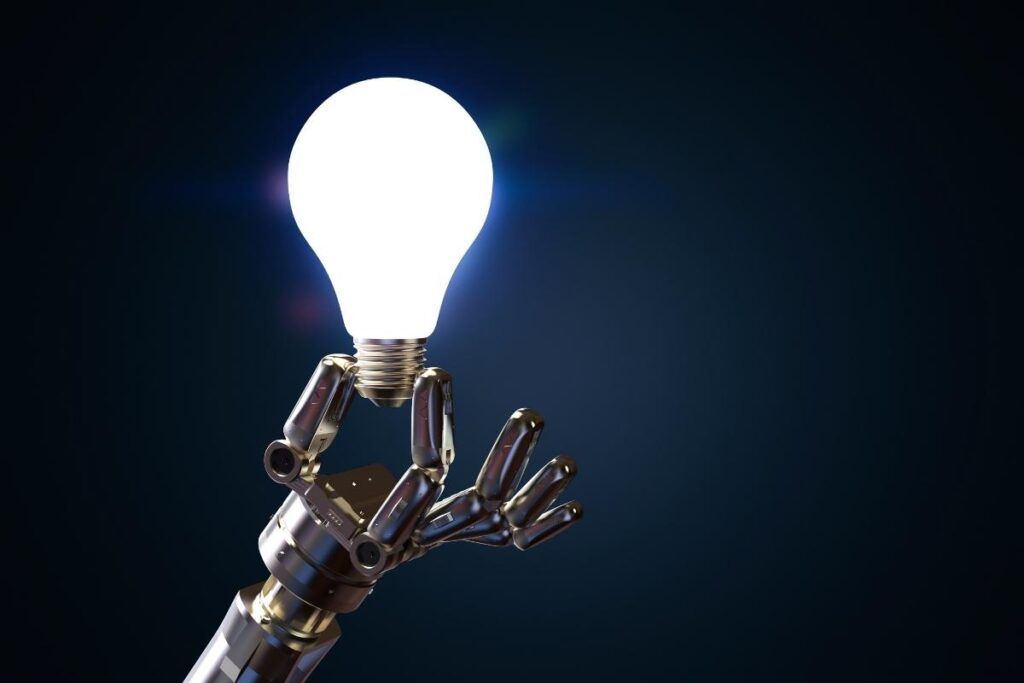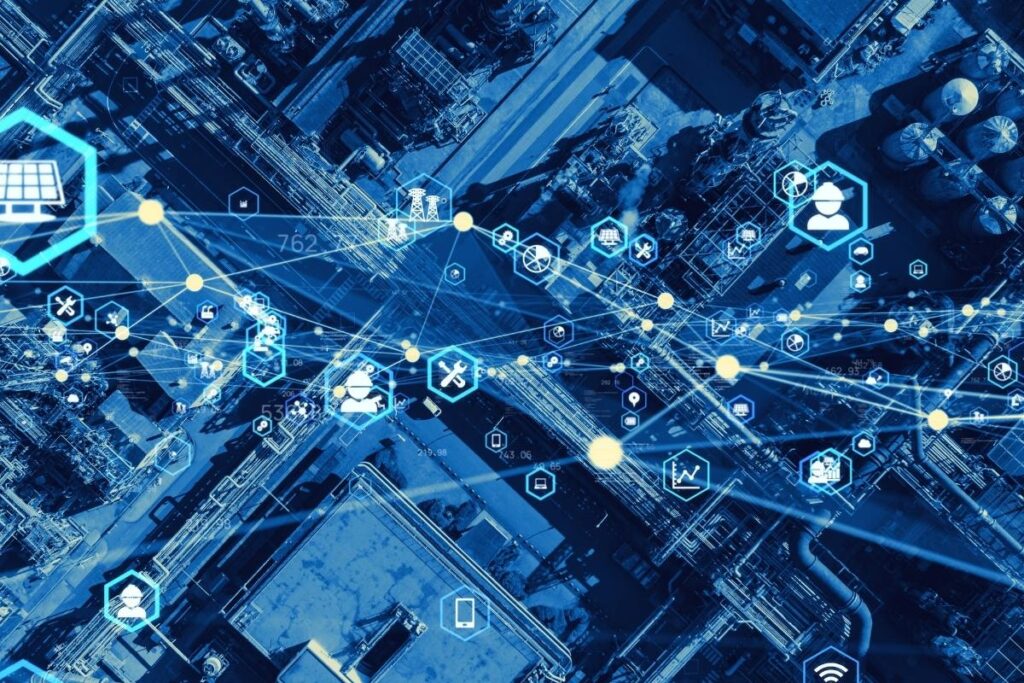The manufacturing industry is undergoing a transformative phase fuelled by the power of Artificial Intelligence (AI). From robotic assembly lines to predictive maintenance, AI is revolutionising how manufacturers operate, driving unprecedented levels of precision and efficiency. This article explores the impact of AI in Manufacturing, providing a comprehensive understanding of its applications, benefits, and future potential.
The Dawn of AI in Manufacturing
As the Fourth Industrial Revolution unfolds, the manufacturing industry is witnessing a significant shift in its operational paradigm. Today’s factories are no longer confined to manual labour and rudimentary machinery. Instead, they are embracing technologies like AI, robotics, and the Internet of Things (IoT), transforming into sophisticated ‘smart factories’. This evolution is not merely a trend; it’s a necessity for survival in a highly competitive and technologically advanced business landscape.
AI in Manufacturing is the utilisation of machine learning algorithms and AI-driven software to improve and automate manufacturing processes. It enables manufacturers to harness the potential of vast volumes of data generated by industrial IoT and smart factories, transforming these data streams into actionable insights and tangible business outcomes.
Unleashing the Power of Data with Deep Learning
One of the critical applications of AI in manufacturing is deep learning, a subset of machine learning. Deep learning algorithms are remarkably adept at identifying patterns in enormous datasets, turning raw, unstructured data into meaningful insights. These insights can guide strategic decision-making, optimise operational efficiency, and drive business growth.
Deep learning algorithms learn from the data they process, drawing inspiration from the human brain’s neural networks. The more data the algorithm processes, the more it learns and improves, allowing for continuous enhancement of its analytical capabilities.
The Synergy of Simulation and Automation
The Industrial Internet of Things (IIoT) plays a pivotal role in modern manufacturing. IIoT devices, ranging from machinery sensors to cameras, generate vast amounts of real-time data. When analysed and utilised effectively, this data can significantly optimise manufacturing processes and workflows.
One of the ways to harness IIoT data is through the use of Digital Twins. A digital twin is a virtual model of a physical asset, receiving real-time data from the asset’s sensors. This digital-physical pairing allows manufacturers to monitor, analyse, and optimise their operations, facilitating digital experimentation and predictive maintenance.
According to research, predictive maintenance powered by AI can reduce machinery downtime by half and extend the lifespan of industrial equipment by up to 40%.
Enhancing Supply Chain and Quality Control with AI
The influence of AI in manufacturing isn’t confined to the factory floor. It extends to supply chain management, logistics, and inventory control. AI-powered smart tracking systems can streamline warehouse management, ensuring real-time monitoring of items and vehicles. This capability allows for rapid identification and resolution of bottlenecks, leading to faster delivery times and optimal efficiency.
AI-driven visual inspection tools, utilising computer vision, can substantially improve quality control processes. These tools can detect defects and faults, reducing risks and costs, and enhancing the overall quality of the products.
AI-Driven Decision Making and Customer Experience
AI isn’t just a tool for improving operational efficiency; it’s also a valuable asset for strategic decision-making. By analysing customer data, AI can help manufacturers swiftly respond to market changes and optimise buyer journeys. More accurate demand forecasting, facilitated by AI, can lead to better sustainability and growth for manufacturers.
AI can help manufacturers build customer trust, remove friction from the buying process, and convert first-time buyers into loyal brand advocates.
Prioritising Health and Safety with AI
In the manufacturing industry, safety is paramount. Despite strict adherence to safety regulations, the risk of accidents remains. AI can mitigate these risks by monitoring worker location, vital signs, and even the correct usage of personal protective equipment. If a hazardous situation arises, AI can react much faster than a human, shutting down machinery and ensuring a rapid response.
The Future is Now: AI in Manufacturing
The full potential of AI in manufacturing is still being explored. However, its current applications are already driving significant enhancements in productivity, cost-efficiency, and safety. In theory, the future of manufacturing could see factories operating around the clock with minimal human intervention, guided by AI solutions.
AI is at the heart of the manufacturing industry’s future. It’s not just about using AI to automate processes; it’s about harnessing AI to understand businesses better, control every process, and open new horizons for digital transformation.
Precision Measurement: The Role of AI
In the manufacturing industry, precision measurement is a crucial factor in determining the quality and reliability of products. AI plays a key role in enhancing the accuracy and efficiency of precision measurement processes. AI can identify deviations from the set standards by analysing real-time data from precision measurement tools, enabling immediate corrective action.
In essence, AI is not just improving the precision of measurements; it’s transforming the very fabric of quality control processes in manufacturing.
Embracing AI: The Path Forward
Integrating AI in manufacturing requires significant time, effort, and resources. However, AI’s benefits— increased precision, improved efficiency, enhanced safety, and a better understanding of the business— make it a worthwhile investment.
The key to success lies in quickly transitioning from pilot projects to full-scale implementation. Those who still need to integrate AI into their manufacturing processes must seize the window of opportunity before it closes.
In conclusion, the integration of AI in manufacturing is not just about automating processes and improving efficiency. It’s about harnessing the full potential of AI to drive business growth, sustainability, and customer satisfaction. As the manufacturing world continues to evolve, AI will play an increasingly pivotal role in shaping its future. And for those willing to embrace it, the reward will be a future characterised by innovation, efficiency, and success.

Jeff Eley is the founder and managing director of Eley Metrology, a leading company in the precision measurement industry. With decades of experience in metrology, Jeff has established himself as a respected figure in the field. Under his leadership, Eley Metrology has become renowned for its expertise in coordinate measuring machines (CMMs), digital height gauges, and granite metrology products. Jeff’s vision has driven the company to develop innovative solutions, including custom-designed CMMs and the flagship long-bore measurement machine (LBM). His commitment to excellence and customer-centric approach has positioned Eley Metrology as a trusted provider of high-precision measurement tools and services for industries such as aerospace, automotive, and manufacturing.



